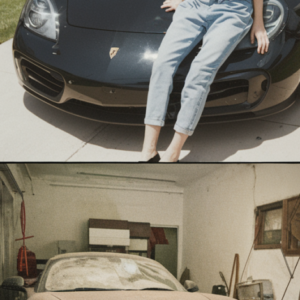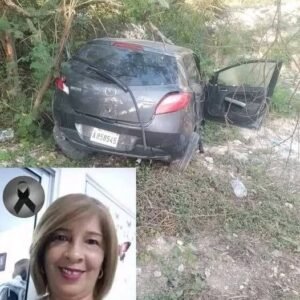I’ve been told my entire life to “be the bigger person.” In my family, that phrase never meant fairness or maturity—it was code for “give Madison what she wants so she won’t throw a fit.” Madison is my cousin, but because our mothers are sisters and we grew up just five blocks apart, we were more like siblings. We spent countless afternoons in each other’s homes, shared meals, and even shared bedrooms when babysitting was needed.
The problem was, Madison never really learned the meaning of “share.” From childhood, it was always one-sided. When I bought a new sweater, she’d “borrow” it, then return it stained with ketchup. If I saved money for a makeup palette, she’d use it carelessly, drop it, and shatter it. My headphones disappeared for days and reappeared cracked, buzzing in one ear. Every time I tried to object, my Aunt Denise would dismiss me with the same line: “She’s younger, Carmen. Just let her have it.” So I did, over and over again, because keeping the peace felt easier than fighting.
By the time I reached my mid-twenties, I had learned to stop asking for fairness and simply set my own quiet goals. One of the biggest was getting a car of my own. I worked weekdays as a receptionist and picked up weekend shifts with a catering company. Every paycheck brought me closer to independence. Eventually, I signed the paperwork on a lease-to-own car—an older model with more miles than I wanted, but still, it was mine. No one bought it for me, no one co-signed the lease, and no one contributed to the payments. I did it alone.
The pride I felt when I first sat in the driver’s seat was indescribable. I promised myself then and there that I would be careful with it and, most importantly, that no one else would drive it.
That promise was tested sooner than I expected. A few days before Madison’s eighteenth birthday, she sent me a text that wasn’t a request but a demand: “Hey, I’m borrowing your car this weekend. It’s my birthday, so mall, spa, everything. Don’t even try to say no!”
I laughed bitterly at her audacity. There was no way I was handing her my car. She’d barely learned how to drive, and her history with other people’s belongings didn’t exactly inspire trust. I texted back firmly: “Sorry, Madi. My car is mine to drive. I’ll need it for work this weekend.”
Her response was immediate and predictable: accusations of selfishness, dramatics about her “ruined” birthday, and seventeen eye-roll emojis. For once, I didn’t soften my reply. I told her if she wanted a car, she could save for one like I did. Then I put down the phone, thinking the matter was closed.
It wasn’t.
Saturday morning, I opened the blinds and froze. My car sat in the driveway draped in toilet paper, streams of white hanging from the mirrors and trees. Worse, yolks and shells from dozens of eggs dripped down the windshield and oozed into the seams of the doors. In the rising summer heat, the egg had already started baking into the paint. My stomach sank.
Security footage confirmed what I already knew: Madison, wearing a glittery birthday sash, and her friends had gleefully pelted my car while filming the entire thing. They laughed as though it were the highlight of their night.
I called Madison, hoping she would feel a flicker of remorse. Instead, she brushed it off. “You got what you deserved,” she said coolly. “If you’d just let me take it, this wouldn’t have happened. It’s just eggs—hose it off.”
When I pointed out that the damage was permanent, she laughed again and hung up. Minutes later, Aunt Denise called to scold me for “overreacting” and reminded me to “be the bigger person.” Uncle Gary chimed in too, telling me I was “pathetic” for wanting an eighteen-year-old to face consequences.
But this time, I didn’t bend. I took the car to a body shop where the service advisor explained that eggs are acidic and had etched into the clear coat. The estimate: nearly $2,500 in repairs. I sent the bill to Madison’s parents, offering them options—pay outright or have Madison work it off. Their response? “We’re not paying a dime. Grow up.”
So I did what I should have done years ago. I filed a police report.
The fallout was swift. Madison, who had committed the vandalism the morning of her eighteenth birthday, was charged as an adult. Her parents raged. She posted teary videos online painting herself as the victim of a “toxic cousin.” Strangers online offered sympathy while ignoring the destruction she had caused.
In court, I finally had the chance to speak. I explained that this wasn’t about a prank but a lifetime of entitlement and disregard. For years, I was told to be quiet and forgiving. This car represented independence, sacrifice, and responsibility. Madison destroyed it because I dared to say no.
The judge listened, then ruled: six months’ probation, forty hours of community service, repayment of my deductible, and a written apology. It wasn’t everything, but it was something. For once, Madison was forced to face real consequences.
The apology letter that arrived weeks later was half-hearted, written under pressure, but still—it was the first time she admitted she was wrong. Slowly, court-ordered checks arrived, and my car was repaired. I drove it to the farmer’s market one weekend, the paint gleaming under the sun, and realized something important.
This wasn’t just about a car. It was about reclaiming my voice. For years, I had been silenced, pushed into being “the bigger person” while others excused bad behavior. But boundaries only matter if you enforce them.
That morning, as I slid behind the wheel, I finally felt lighter. Madison might never truly change, but I had. I had learned that peace built on silence isn’t peace at all. Sometimes, you have to draw a line—and once you do, everything shifts.





